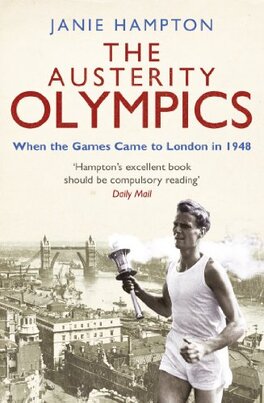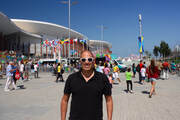An Olympic History Retelling Rich in Detail
A Quick Book Review
It took me 13 years and three Summer Olympics later, but I finally sat down with Janie Hampton's The Austerity Olympics: When the Games Came to London in 1948, originally published as an early primer for London 2012. Better late than never, they say, though. And, I'll pat myself on the back for managing to do so during the first week of Tokyo 2020 competition!
In short, I found a rich detail of London 1948, exceedingly researched and engaging, reminiscent of the much-loved work of David Wallechinsky.

Of course, Hampton's work was published in 2008, without any premonition of what 2020 would bring upon the Olympics. But The Austerity Olympics does provide some similar context - an English public and press skeptical of holding a Games in the aftermath of global conflict, and, specifically to the hosts, within a massively still rebuilding London. Critics decried the perceived allocation of resources while Britons struggled with on-going rationing and reconstruction.
Hampton does a strong job setting that 1948 context, detailing post-war London as the host city tries to accommodate housing, transportation, nutrition, and venue needs for participants.
But the real strength of the book comes as she moves into the Games itself, with deep accounts of all the action, from the Olympic Torch Relay and the Opening Ceremony, to athletics, gymnastics, rowing, soccer, and all the rest. Making London 1948 come alive for the reader is the inclusion of many, many historical firsthand accounts from competitors, and even spectators, as we revisit the exploits of Fanny Blankers Koen, Emil Zatopek, Bob Mathias, Paul Elvstrom, Vicki Draves, and more.
Along the way, a picture of London 1948 is clear. Aside from operational innovations debuted at the Games - the first photo-finish use, the first track starting blocks, the first female gender testing - the real power of the Games success (even the previous critics came around as the Games progressed) was that they went on at all. Holding an Olympics when they could at a time of upheaval provided a moment of inspiration and community. London 1948 was the first Olympics held after 1940 and 1944 editions had been cancelled. What would have happened to the Olympic movement had organizers given in and cancelled again?
Perhaps there is a connection to be seen through to Tokyo 2020. That the current Summer Games are being held, despite an on-going level of crisis and diminished capability, is testament to the strength and need of Olympism to persevere. Time will tell, perhaps in just about a week's time as these Games close, whether today's Games will similarly be seen as a positive marker as London 1948.


 RSS Feed
RSS Feed